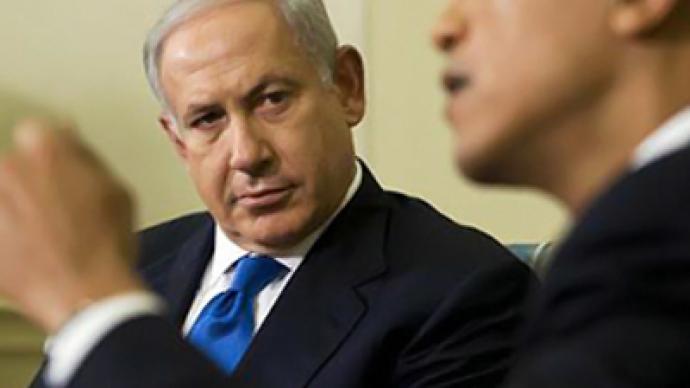When will Israel start supporting America?

With the US taxpayer already shelling out huge sums for the benefit of Israel, will Washington’s demands to freeze Israeli settlement construction come about, or is the relationship between the two truly one-sided?
Israel receives around $3 billion in direct foreign assistance every year from the US, which represents about one-fifth of America’s foreign aid budget. Moreover, the United States has given Israel about the same amount to develop sophisticated weapons systems, like the Lavri aircraft, while giving Israel access to cutting-edge US weapon systems, like the Blackhawk helicopter and the F-16 fighter jet.
These huge expenditures on behalf of the American taxpayer continue despite Israel’s determination to build Jewish settlements in East Jerusalem – the most fiercely contested piece of property in the world.
Put simply, East Jerusalem refers to the section of the city that was captured by Jordanian forces in the 1948 Arab-Israeli War, and then taken by Israel in the 1967 Six Day War. Israel now claims the entire city as its own, a declaration that is not recognized by the international community. Although the United States has said that East Jerusalem should play a part in any peace with the Palestinians (the Palestinians want East Jerusalem as the capital of its future state), Israel asserts that Jerusalem will remain the undivided capital of the State of Israel.
However, it looks as if Washington’s impatience with Israel over the issue is quickly coming to an end, and this was strikingly clear following Vice President Joe Biden’s trip to Israel on March 8-9.
Shortly after Biden vowed unyielding American support for Israel’s security, the Israeli Interior Ministry announced 1,600 new housing units for Jews in East Jerusalem. If the government of Benjamin Netanyahu was calculating that the Obama administration would take the announcement lying down, they figured wrong, horribly wrong.
Biden condemned the move as “precisely the kind of step that undermines the trust we need right now,” while US Secretary of State Hillary Clinton called the move “an insult.”
Netanyahu assured Washington that the timing of the announcement was a mistake, yet refused to give an inch of ground on the question of Jewish settlements in East Jerusalem.
“Jerusalem is not a settlement,” the Israeli prime minister said in a speech in Washington (March 23) to the American Israel Public Affairs Committee (AIPAC), the powerful pro-Israeli lobby. “It’s our capital.”
Netanyahu then advised the United States on how to approach the problem of a peace settlement between the Israelis and the Palestinians.
“Of course, the United States can help the parties resolve their problem, but it cannot solve the problems for the parties,” he said. “Peace cannot be imposed from the outside.”
Although the Israeli prime minister may be right in his general assessment of the situation, it could also be said that peace will never become a reality if the process is left to the Israelis and Palestinians alone to resolve. This is readily apparent after more than three decades of myriad road maps for peace have all led to exasperating dead ends.
Last week, Netanyahu paid a visit to US President Barack Obama in the White House in an effort to put the brakes on the rapidly deteriorating situation. But Netanyahu left Washington not only without an “announcement of restored relations” with his American counterparts, but also without a press appearance or official photo of the meeting to boot.
But there were two things that Netanyahu did receive from his trip to Washington: plenty of negative publicity back home for “cowering to Obama” (one Israeli paper wrote that Netanyahu received “the treatment reserved for the president of Equatorial Guinea”), in addition to a request to “freeze construction in East Jerusalem for four months in exchange for an attempt to renew stalled Israeli peace talks with Palestinians,” Haaretz, quoting a government source, reported on Wednesday.
Washington hopes such a deal could persuade the Palestinians to renew direct negotiations rather than indirect “proximity” talks, as had been planned, the source concluded.
The request from Washington is part of a longer list of measures that the US believes Israel is obliged to adopt in order to revive peace talks with the Palestinians.
“Netanyahu's differences with the Obama administration on Jerusalem have put him in a political bind, as he seeks to avoid harming Israel's critical security ties with Washington while keeping his pro-settler ruling coalition from breaking apart,” the paper concluded.
The cooling of relations between Jerusalem and Washington has served to reveal major differences as to what both sides expect from any sort of final peace plan. Indeed, Israel and Washington seem to have been living in a state of denial as far as their real intentions are concerned. Moreover, as the bilateral breakdown continues to fester, the United States sees its role as a legitimate peace mediator being undermined.
At the same time, there is also the fear that Israel’s intransigence on the issue of new settlements is exposing US troops, now fighting wars on two fronts in the region in Afghanistan and Iraq, to unnecessary dangers.
“This is starting to get dangerous for us,” Biden reportedly told Netanyahu. “What you are doing here undermines the security of our troops who are fighting in Iraq, Afghanistan and Pakistan. That endangers us and it endangers regional peace.”
As the Israeli daily Yedioth Ahronoth reported: “The vice president told his Israeli hosts that since many people in the Muslim world perceived a connection between Israel's actions and US policy, any decision about construction that undermines Palestinian rights in East Jerusalem could have an impact on the personal safety of American troops fighting against Islamic terrorism.”
The message couldn't be plainer: Israel's intransigence could cost American lives.
So the question increasingly being heard around Washington these days is: When will Israel begin to support us?














